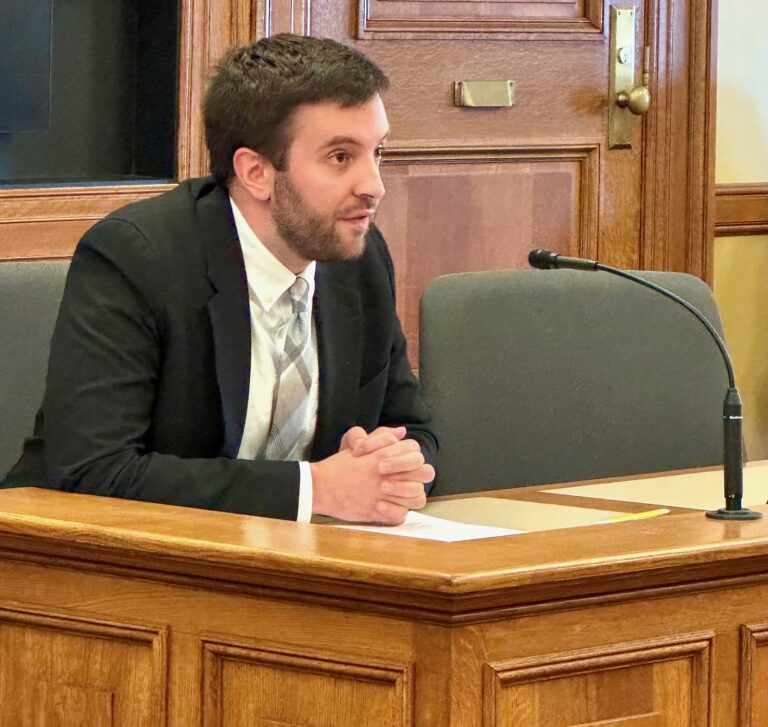Efforts to implement Walker-era legislation to restructure Wisconsin’s youth justice program took another hit after members of a panel charged with making recommendations regarding new youth prisons roundly criticized the panel’s work.
Members of the Juvenile Justice Grant Committee, in interviews with WisPolitics.com, agreed with one member’s characterization of the process as “a setup for failure” after recommendations recently submitted to the Joint Finance Committee came in nearly 40% over budget.
What’s more, the plans from Dane, Green, Milwaukee and Racine counties to build new juvenile lockups to replace Lincoln Hills and Copper Lake come up at least 52 beds short of the total needed to get eligible youth out of troubled northern facilities.
“If these things are all just going to get dumped in Joint Finance’s lap, well then what was the sense of having our committee do all that work or even having a committee in the first place?” asked JJGC member Rep. Joe Sanfelippo, R-New Berlin.
The recommendations submitted by the youth justice panel marked the culmination of more than a year-and-half worth of work aimed at moving away from a central youth prison. Instead, lawmakers envisioned a three-pronged approach that centered on efforts to keep young offenders close to home.
Under 2017 Act 185, unanimously backed in both the Assembly and Senate and signed into law by former Gov. Scott Walker, so-called “serious juvenile offenders’ from Lincoln Hills would be placed in one of two “Type 1” facilities to be built and run by the state. Less serious offenders would be sent to county-run Secure Residential Care Centers for Children and Youth, or SRCCCYs, whose construction would be financed almost entirely by the state.
The measure also called for an expansion of the Department of Health Service’s Mendota Juvenile Treatment Center, a mental health intervention facility for violent and treatment-resistant young offenders.
But implementation has been problematic.
Pushback against Type 1 sites in Milwaukee and Hortonia, a town northwest of Appleton, has been fierce.
Corrections Secretary Kevin Carr and Milwaukee Mayor Tom Barrett faced boos and jeers from city residents during a March listening session when they announced the site on Mill Road and Teutonia Avenue was “a done deal.” And Hortonia residents protested in June, citing property taxes, safety, and concerns that a prison will deter the rapidly growing Fox Valley business sector from expanding to the town.
Efforts to work with counties to develop grant proposals to build less restrictive SRCCCYs, meanwhile, have been plagued by missed deadlines and dissatisfaction from both members of the panel and county representatives.
Lawmakers in June were forced to rush through changes to Act 185 that moved back the deadline for the grant committee to submit recommendations and pumped more money into SRCCCYs after counties made it clear the original legislation would be unworkable.
But even after the original SRCCCY budget of $40 million was doubled and the target date to submit county plans to JFC was pushed back by three months, the final report called for a $111 million expenditure that wouldn’t have a place for all SRCCCY-eligible youth at Lincoln Hills.
“To just send everything over to Joint Finance on a hope and a prayer that they’re gonna come up with the money, I don’t think we did our job,” said GOP Rep. Michael Schraa, who sat on the JJGC and authored Act 185 alongside Dem Rep. Evan Goyke.
But Schraa, along with seven other members of the 10-person panel, voted for the final recommendations. The Oshkosh Republican told WisPolitics.com he didn’t “want to take the risk of not passing something.”
“We need to do something so I wasn’t about ready to vote against it, because then that’s just kicking the can down and not making any decision,” he said.
The two panel members who voted against the final plan — Sanfelippo and Sharlen Moore, the community representative and co-founder of the Milwaukee-based youth outreach organization Urban Underground — shared Schraa’s financial concerns.
“Do the people on the committee expect Joint Finance to wave a magic wand and create money?” Sanfelippo asked.
“Look, I took my responsibility on that committee very seriously, which was to come up with some recommendations that fit within the amount of money we have budgeted. That’s what I was working towards, that’s what I was planning on doing, but the majority of the committee felt differently.”
Moore raised similar concerns and told WisPolitics.com she hopes “the Joint Finance Committee only funds $80 million, because that’s what it says in the budget.”
“I don’t think we should spend a dime over $80 million on more bricks and mortar,” she said. “If we are willing to put more money into it, it should solely go to programs.”
Moore echoed the sentiments raised by counties, who were worried throughout the process that the original legislation was too focused on new buildings when the state should be shifting the youth justice system to a prevention and rehabilitation programming model.
“Bricks and mortar, building, building, building. That’s not what’s going to get us out of this,” she said. “What’s going to get us there is putting funding back into communities and neighborhoods that need the most support.”
Rep. David Crowley, a Milwaukee Dem who was Gov. Tony Evers’ pick to sit on the grant committee, conceded lawmakers “should have probably started with the programming first” and said the panel was “rushed” by the deadlines imposed by Act 185.
“We can talk about the political motivations, which I think there’s some truth behind that,” he said, referencing allegations the unanimously passed youth justice overhaul was pushed through to hand Walker a win ahead of his reelection fight.
“But it was also rushed to make sure that we can get these young people out of Lincoln Hills.”
Crowley ultimately defended the process that resulted in recommendations that blew through the panel’s budget.
“At the end of the day, I think that this is one of the best proposals that we could put forward with what we had and who applied,” he said.
The panel’s report now sits with the state’s budget panel, which must find an additional $31 million or find a way to chop down costs to fit the state’s budget.
But JFC Co-Chair Sen. Alberta Darling, who also sat on the JJGC, told WisPolitics.com that “at this point, a lot has to be done to justify the expenditures.”
The River Hills Republican said she was happy with the grant committee’s process but understood her colleagues’ frustration with the recommendations that came in over budget.
She said she had not spoken with the members of the budget panel about the grant proposal and added it would be Carr’s responsibility to sell them on the plan.
“I told (Carr) that he has to come and talk with the majority leader in the Senate and the speaker and the Assembly and talk to all the finance members because I can’t carry a heavy load like that,” she said. “It has to be explained as a critical part of the governor’s project. We can’t carry that kind of a load without the governor really spearheading that.”
Regardless of how JFC decides to handle this batch of SRCCCYs, Schraa, Sanfelippo, Moore and Crowley all told WisPolitcs.com they expected more juvenile justice projects on the horizon. All four pointed to the western half of the state, which will not have a SRCCCY after La Crosse County pulled out of the application process.
“We know that it’s a lot more that needs to be done,” Crowley said.
For more, visit WisPolitics.com
The Capitol Report is written by editorial staff at WisPolitics.com, a nonpartisan, Madison-based news service that specializes in coverage of government and politics, and is distributed for publication by members of the Wisconsin Newspaper Association.
Copyright © WisPolitics.com



